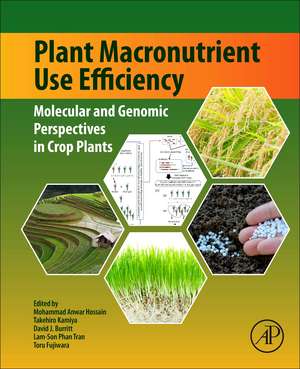Plant Macronutrient Use Efficiency: Molecular and Genomic Perspectives in Crop Plants
Editat de Mohammad Anwar Hossain, Takehiro Kamiya, David Burritt, Lam-Son Phan Tran, Toru Fujiwaraen Limba Engleză Paperback – 28 iul 2017
Plant Macronutrient Use Efficiency provides a comprehensive overview of the complex mechanisms regulating macro-NUE in crop plants, which is required if plant breeders are to develop modern crop varieties that are more resilient to nutrient-associated stress. Identification of genes responsible for macro-NUE and nutrient-related stress tolerance in crop plants will help us to understand the molecular mechanisms associated with the responses of crop plants to nutrient stress.
This volume contains both fundamental and advanced information, and critical commentaries useful for those in all fields of plant science research.
- Provides details of molecular and genetic aspects of NUE in crop plants and model plant systems
- Presents information on major macronutrients, nutrient sensing and signaling, and the molecular and genomic issues associated with primary and secondary macronutrients
- Delivers information on how molecular genetic information associated with NUE can be used to develop plant breeding programs
- Includes contributions from world-leading plant nutrition research groups
Preț: 914.98 lei
Preț vechi: 1305.91 lei
-30% Nou
Puncte Express: 1372
Preț estimativ în valută:
175.07€ • 183.78$ • 145.32£
175.07€ • 183.78$ • 145.32£
Carte tipărită la comandă
Livrare economică 03-17 aprilie
Preluare comenzi: 021 569.72.76
Specificații
ISBN-13: 9780128113080
ISBN-10: 0128113081
Pagini: 418
Dimensiuni: 191 x 235 x 27 mm
Editura: ELSEVIER SCIENCE
ISBN-10: 0128113081
Pagini: 418
Dimensiuni: 191 x 235 x 27 mm
Editura: ELSEVIER SCIENCE
Cuprins
1. Molecular and Genetic Basis of Plant Macronutrient Use Efficiency: Concepts, Opportunities, and Challenges
2. Role of Nutrient-Efficient Plants for Improving Crop Yields: Bridging Plant Ecology, Physiology, and Molecular Biology
3. Macronutrient Sensing and Signaling in Plants
4. The Significance of Nutrient Interactions for Crop Yield and Nutrient Use Efficiency
5. The Contribution of Root Systems to Plant Nutrient Acquisition
6. Molecular Genetics to Discover and Improve Nitrogen Use Efficiency in Crop Plants
7. The Role of Root Morphology and Architecture in Phosphorus Acquisition: Physiological, Genetic, and Molecular Basis
8. Potassium Sensing, Signaling, and Transport: Toward Improved Potassium Use Efficiency in Plants
9. Understanding Calcium Transport and Signaling, and its use Efficiency in Vascular Plants
10. The Role of Calcium in Plant Signal Transduction Under Macronutrient Deficiency Stress
11. Magnesium Homeostasis Mechanisms and Magnesium use Efficiency in Plants
12. Advances in Understanding Sulfur Utilization Efficiency in Plants
13. Water Availability and Nitrogen use in Plants: Effects, Interaction, and Underlying Molecular Mechanisms
14. NPK Deficiency Modulates Oxidative Stress in Plants
15. Genetic Improvements of Traits for Enhancing NPK Acquisition and Utilization Efficiency in Plants
16. Endophytic Bacteria and Rare Earth Elements; Promising Candidates for Nutrient use Efficiency in Plants
17. Introduction to GWAS and MutMap for Identification of Genes/QTL using Next-Generation Sequencing
18. Transgenic Approaches for Improving Phosphorus use Efficiency in Plants
19. Transgenic Approaches for Improving Nitrogen and Potassium use Efficiency in Plants
20. Future Climate Change and Plant Macronutrient use Efficiency
2. Role of Nutrient-Efficient Plants for Improving Crop Yields: Bridging Plant Ecology, Physiology, and Molecular Biology
3. Macronutrient Sensing and Signaling in Plants
4. The Significance of Nutrient Interactions for Crop Yield and Nutrient Use Efficiency
5. The Contribution of Root Systems to Plant Nutrient Acquisition
6. Molecular Genetics to Discover and Improve Nitrogen Use Efficiency in Crop Plants
7. The Role of Root Morphology and Architecture in Phosphorus Acquisition: Physiological, Genetic, and Molecular Basis
8. Potassium Sensing, Signaling, and Transport: Toward Improved Potassium Use Efficiency in Plants
9. Understanding Calcium Transport and Signaling, and its use Efficiency in Vascular Plants
10. The Role of Calcium in Plant Signal Transduction Under Macronutrient Deficiency Stress
11. Magnesium Homeostasis Mechanisms and Magnesium use Efficiency in Plants
12. Advances in Understanding Sulfur Utilization Efficiency in Plants
13. Water Availability and Nitrogen use in Plants: Effects, Interaction, and Underlying Molecular Mechanisms
14. NPK Deficiency Modulates Oxidative Stress in Plants
15. Genetic Improvements of Traits for Enhancing NPK Acquisition and Utilization Efficiency in Plants
16. Endophytic Bacteria and Rare Earth Elements; Promising Candidates for Nutrient use Efficiency in Plants
17. Introduction to GWAS and MutMap for Identification of Genes/QTL using Next-Generation Sequencing
18. Transgenic Approaches for Improving Phosphorus use Efficiency in Plants
19. Transgenic Approaches for Improving Nitrogen and Potassium use Efficiency in Plants
20. Future Climate Change and Plant Macronutrient use Efficiency
